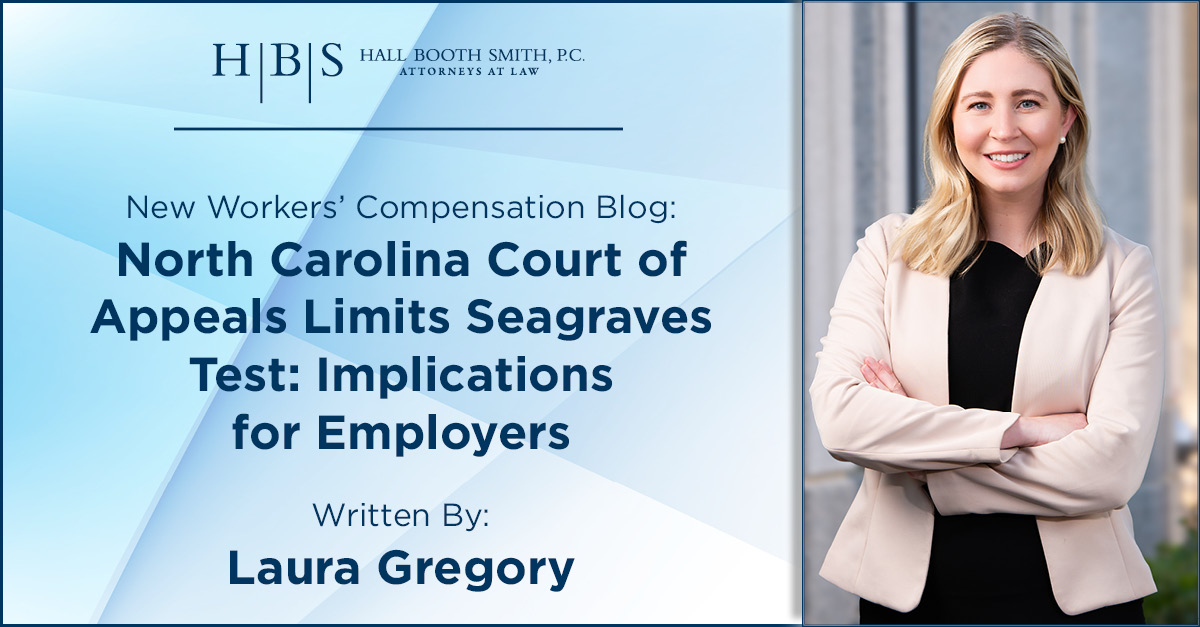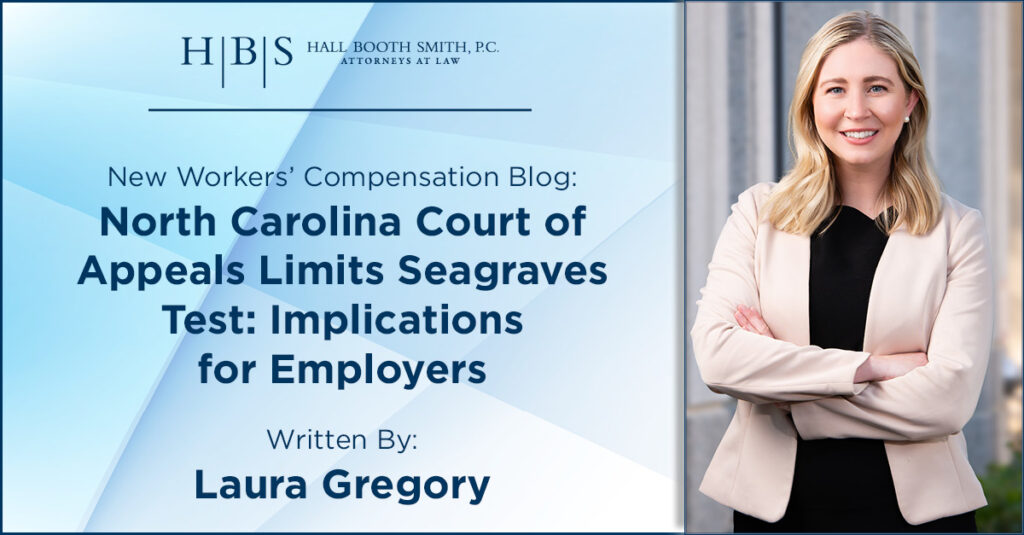
North Carolina Court of Appeals Limits Seagraves Test: Implications for Employers

Written by: Laura Gregory, Esq.
Recently, the North Carolina Court of Appeals issued a holding that declined to extend the Seagraves test, which is used by courts to determine whether an employee constructively refused suitable employment when they have been terminated for cause unrelated to their work injury. This holding significantly limits an employer’s ability to respond to employees’ reckless, dangerous, or intentional disregard for safety policies and will no doubt create issues for employers’ freedom in responding to work-related injuries.
In Clarence Richards v. Harris Teeter, Inc., (S.E.2d, 2022 WL 4077475 2022-NCCOA-595) the plaintiff worked as a truck driver and was injured in a single-vehicle accident on August 3, 2019, when his truck ran off the road. The investigation of the accident determined that the plaintiff lost control of his vehicle and wrecked into a field. Plaintiff was written out of work while treating for his back injury; the defendant accepted his claim for workers’ compensation benefits for a “low back” injury and began paying indemnity and medical compensation. Shortly after the accident, Defendant terminated Plaintiff’s employment for a “Violation of Established Safety Procedures” after a review committee determined the accident was preventable (the truck’s cab camera showed Plaintiff closing his eyes for 7-10 seconds which led to the accident).
Plaintiff was released to return to sedentary work on August 15, 2019, but was assigned restrictions of no driving of a truck professionally. On April 30, 2020, Plaintiff’s counsel filed a Form 33, “Request that Claim be Assigned for Hearing,” alleging that Defendant had failed and refused to pay past due Temporary Total Disability (TTD) benefits. The claim was heard before the Deputy Commissioner on July 8, 2020, and an Opinion and Award was entered on January 12, 2021, ordering Defendant to pay past and ongoing TTD benefits until Plaintiff returned to work. Defendant appealed, and the Full Commission awarded the same payment in their Opinion and Award on August 26, 2021. Defendant appealed again to the Court of Appeals, which reaffirmed the findings of the Full Commission by declining to extend the Seagraves test.
Defendant argued that Plaintiff constructively refused suitable employment because he was terminated for cause, and that, but for the termination for cause, Plaintiff would have remained employed at his pre-injury wages because Defendant would have accommodated Plaintiff’s post-injury restrictions. The Court of Appeals disagreed. They cited N.C.G.S. § 97-32, which provides that “[i]f an injured employee refuses suitable employment as defined by G.S. 97-2(22), the employee shall not be entitled to any compensation at any time during the continuance of such refusal, unless in the opinion of the Industrial Commission such refusal was justified.”
They noted that, in Seagraves v. Austin Co. of Greensboro (123 N.C. App. 228, 472 S.E.2d 399; 1996), the test of whether an employee can be deemed to have refused suitable employment was to measure whether the employee’s loss of earning capacity was attributable to the wrongful act that caused the employee’s termination from employment, in which case benefits would be barred, or whether such loss of earning capacity is due to the employee’s work-related disability, in which case the employee would be entitled to benefits intended for such disability. However, the Court agreed with the Full Commission’s interpretation of Seagraves in the present case, wherein they noted that the plaintiff had been terminated from his regular job for his role in the very accident that caused his work injury; this was differentiated from the plaintiff in Seagraves, who had been terminated for an inadvertent error she performed while working in her light duty position following the work injury. They agreed with the Full commission that, given these fundamental factual differences, the Seagraves test was not applicable.
The Court of Appeals held, “In seeking to apply the Seagraves test to cases such as this…. Defendants essentially ask this Court to impose a for-cause bar to recovery of workers’ compensation benefits when the employee is unable to find suitable employment elsewhere. Defendants’ position is fundamentally incompatible with the well-established principles and purposes of the workers’ compensation system, which deliberately eliminates negligence from its calculus in all but certain narrowly defined instances.”
This holding is obviously detrimental for employers, who now may feel constrained and unable to fairly reprimand/terminate employees for serious policy offenses if the offense caused a work injury. There are endless situations where an employee’s reckless or even intentional behavior can put themselves and/or other workers, customers, or bystanders at risk, especially in industries such as trucking, construction, or other heavily regulated professions. Employers may now feel as if they are stuck between a rock and a hard place when faced with an instance where an employee violated company or safety policies and also became injured in the process, but they feel they can not treat the employee as they would any other employee who violated policy.
It is unclear whether this case will be appealed, but for now, it strikes a blow to employers’ abilities to hire and fire their employees for reckless or dangerous behavior. If you are concerned on how this holding affects your ability to reinforce your safety policies and procedures, please contact us. We are happy to provide advice on how to interpret this case.


Leave a comment
You must be logged in to post a comment.